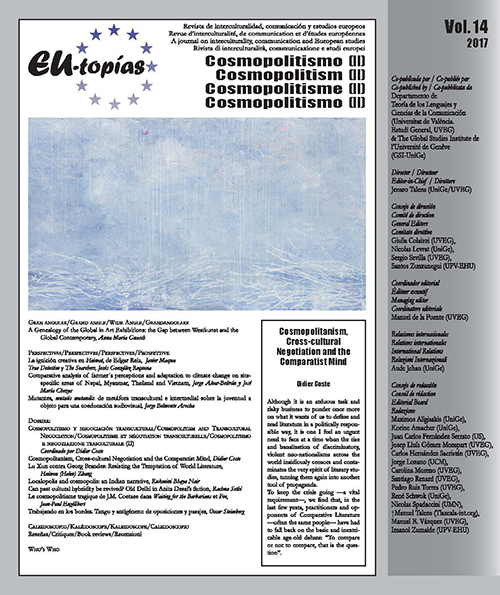Lu Xun contra Georg Brandes: Resisting the Temptation of World Literature
DOI:
https://doi.org/10.7203/eutopias.0.18597Keywords:
Lu Xun, Georg Brandes, Weltliteratur, Comparative literature Abstract
Abstract
Two architects of the modern breakthrough. Two transreaders of historical context and intellectual legacy. Both reimagine “world literature” while wrestling with conformity and fame. Each travels an idiosyncratic, though profoundly intertwined, path. Georg Brandes (1842-1927) captivates Europe and Asia with a work designed for Denmark; the moment he fashions it for the universe however, he loses ground. Lu Xun (1881-1936) devotes his translator’s life to unrecognized works in the construction of an alternative frame for Weltliteratur; these tune his writer’s voice that bestows upon him unrequested stardom in modern classics of the whole world. Brandes’s ironic paradox and Lu Xun’s iconoclastic prejudice allude to mirrored discoveries. Exploring their individual cases enables us to discern decisive moments in the evolution of comparative literature. Placing them in juxtaposition reveals a contrast between kindred spirits— an intricate distinction that informs our actions as comparatists.
 Downloads
Downloads
Downloads
Published
How to Cite
-
Abstract245
-
PDF69
Issue
Section
License
![]()
The authors conserve the copyright. All content published in EU-topías. Journal of interculturality, Communication, and European Studies are subject to the license Creative Commons Attribution-NonCommercial-ShareAlike 4.0 license. The full text of the license can be found at <http://creativecommons.org/licenses/by-nc-sa/4.0>
They may be copied, used, disseminated, transmitted and publicly displayed, provided that:
- The authorship and original source of the publication is cited (journal, publisher and URL of the work).
- They are not used for commercial purposes.
- The existence and specifications of this license of use are mentioned.
It is the responsibility of the authors to obtain the necessary permissions for images that are subject to copyright.



